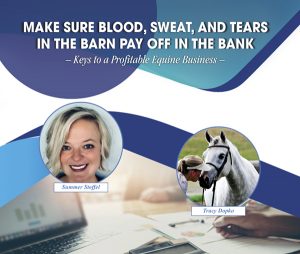Keys to a Profitable Equine Business
Click here to read the complete article
“Do what you love and you’ll never work a day in your life,” is common advice for those starting down a career path or pursuing a career change. But what happens when what you love is horses, and high expenses come with a life in this industry? Can the work pay off and transform into a profitable business? Or equine enthusiasts that try to transform their passion into a livelihood might become tellers of the famous one-liner, “My horse eats better than I do.”
Two experts in equine business and business marketing, Tracy Dopko and Summer Stoffel, shed light on the key factors necessary to ensure that the blood, sweat and tears in the barn pay off in the bank, as well.
Do Thorough Research to Build a Business Plan
The horse world is notoriously, and unfortunately, one of high effort and low profit. Labor demands and finances required are high, as are client expectations, while profit margins can be dangerously low. The result is that even the most solid business can experience a tedious balancing act just to keep their doors open. For these reasons, an abundance of research and planning needs to be the first step for entrepreneurs, according to Summer Stoffel, Chief Executive Officer at Equicore. “Loving horses is a noble cause, but it’s not a foundation for a business,” Stoffel says. “You need to make sure you’ve asked yourself the hard questions.” Those questions include the basics, such as: What services or products will you offer? Who are your competitors? And how big and saturated the target market has become.
More complex considerations might include building a business plan and performing a cost/profit analysis. While some aspects of building an equine business require special consideration of the horse industry itself, Stoffel says using tried and true methods of business development analysis procedures that are already used in other industries will work just fine for this step of the process.
A business plan is too often regarded as a necessary document for the initial step of business startup and not a document that should guide the business throughout its existence. But that’s exactly what it should do. In fact, they are referred to as “living documents,” meaning they should be updated and modified over time to reflect the realities of the business, market, and more. The best business plans clearly define short and long-term goals, include industry and market analysis, define target market, and predict sales estimates or profit margins.
Stoffel recommends including whether there is an element of your business that’s proprietary to you that might set you apart from the competition, any hidden costs that may arise, and any out-of-the-box solutions that could be additional revenue streams. “Prepare for the worst and hope for the best. Then, you will have more tools at your disposal to ensure your business is successful,” Stoffel advises.
Market Your Uniqueness











